Curiosity Invited Podcast. David Bryan in dialogue with David Boulton about learning and the role it plays in how human beings become who they become. #DavidBryan #learning #healthylearning #whatislearning #whatsnotlearning #curiosityinvited
Tag Archives | learning
The W3C Accessibility for Children Design Group
I’ve been part of a World Wide Web Consortium design group that is developing the accessibility guidelines for how the internet will evolve to support children. So far we have had 16 meetings. The group put out a survey to its members in an attempt to learn how to best orient its next steps. The […]
Share this:
- Click to share on Facebook (Opens in new window) Facebook
- Click to share on X (Opens in new window) X
- Click to share on LinkedIn (Opens in new window) LinkedIn
- Click to share on Pinterest (Opens in new window) Pinterest
- Click to share on Pocket (Opens in new window) Pocket
- Click to share on Reddit (Opens in new window) Reddit
- Click to share on Telegram (Opens in new window) Telegram
- Click to share on Tumblr (Opens in new window) Tumblr
- Click to share on WhatsApp (Opens in new window) WhatsApp
- Click to email a link to a friend (Opens in new window) Email
- Click to print (Opens in new window) Print
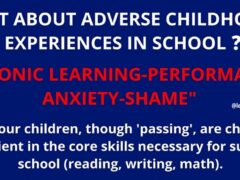
What is the ACE score for chronically feeling not good enough in school?
Since the initial emergence of ACE I’ve been interested in getting an additional type of ACE added to the framework: the adverse childhood experience of feeling CHRONICALLY NOT GOOD ENOUGH AT LEARNING. Where is the ACE score for “Chronic Learning-Performance Anxiety-Shame”? For day after day, week after week, month after month, year after year feeling […]
Share this:
- Click to share on Facebook (Opens in new window) Facebook
- Click to share on X (Opens in new window) X
- Click to share on LinkedIn (Opens in new window) LinkedIn
- Click to share on Pinterest (Opens in new window) Pinterest
- Click to share on Pocket (Opens in new window) Pocket
- Click to share on Reddit (Opens in new window) Reddit
- Click to share on Telegram (Opens in new window) Telegram
- Click to share on Tumblr (Opens in new window) Tumblr
- Click to share on WhatsApp (Opens in new window) WhatsApp
- Click to email a link to a friend (Opens in new window) Email
- Click to print (Opens in new window) Print
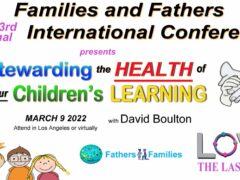
Families and Fathers Conference 2022
For parents and all those who support parents: Join us on March 9, 2002, for a special presentation of “Stewarding the Health of YOUR Children’s Learning”. The live presentation will show on the big screens of the 23rd Annual Families and Fathers Conference in Los Angeles, Ca. and will be available for streaming. For more […]
Share this:
- Click to share on Facebook (Opens in new window) Facebook
- Click to share on X (Opens in new window) X
- Click to share on LinkedIn (Opens in new window) LinkedIn
- Click to share on Pinterest (Opens in new window) Pinterest
- Click to share on Pocket (Opens in new window) Pocket
- Click to share on Reddit (Opens in new window) Reddit
- Click to share on Telegram (Opens in new window) Telegram
- Click to share on Tumblr (Opens in new window) Tumblr
- Click to share on WhatsApp (Opens in new window) WhatsApp
- Click to email a link to a friend (Opens in new window) Email
- Click to print (Opens in new window) Print
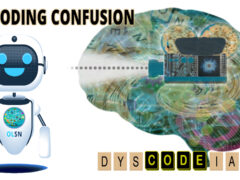
Part 3: Decoding Confusion – The Bottleneck to Progress in Reading
A short but deep journey into the root cause of reading difficulties and a new way of thinking about how to support children and adults who are learning to read and/or reading to learn.
Share this:
- Click to share on Facebook (Opens in new window) Facebook
- Click to share on X (Opens in new window) X
- Click to share on LinkedIn (Opens in new window) LinkedIn
- Click to share on Pinterest (Opens in new window) Pinterest
- Click to share on Pocket (Opens in new window) Pocket
- Click to share on Reddit (Opens in new window) Reddit
- Click to share on Telegram (Opens in new window) Telegram
- Click to share on Tumblr (Opens in new window) Tumblr
- Click to share on WhatsApp (Opens in new window) WhatsApp
- Click to email a link to a friend (Opens in new window) Email
- Click to print (Opens in new window) Print
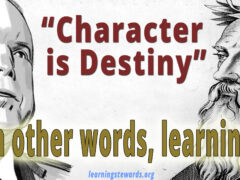
Learning: Character
“The content of your character is your choice. Day by day, what you do is who you become” – Heraclitus “It is your character, and your character alone, that will make your life happy or unhappy. That is all that really passes for destiny. And you choose it. No one else can give it to […]
Share this:
- Click to share on Facebook (Opens in new window) Facebook
- Click to share on X (Opens in new window) X
- Click to share on LinkedIn (Opens in new window) LinkedIn
- Click to share on Pinterest (Opens in new window) Pinterest
- Click to share on Pocket (Opens in new window) Pocket
- Click to share on Reddit (Opens in new window) Reddit
- Click to share on Telegram (Opens in new window) Telegram
- Click to share on Tumblr (Opens in new window) Tumblr
- Click to share on WhatsApp (Opens in new window) WhatsApp
- Click to email a link to a friend (Opens in new window) Email
- Click to print (Opens in new window) Print

Our Future Depends on How Well We Learn Together
#MeToo #BlackLivesMatter #AllLivesMatter #HumanRights #MedicareForAll #ClimateChange #PlanetaryPeace #GenderEquality … Given a multigenerational perspective (which we better have) and the unprecedented complexity, uncertainty, and speed of impending challenges (which we better realize), nothing is more important to humanity’s future than how well we LEARN TOGETHER. Every issue we care about can only be resolved by learning […]
Share this:
- Click to share on Facebook (Opens in new window) Facebook
- Click to share on X (Opens in new window) X
- Click to share on LinkedIn (Opens in new window) LinkedIn
- Click to share on Pinterest (Opens in new window) Pinterest
- Click to share on Pocket (Opens in new window) Pocket
- Click to share on Reddit (Opens in new window) Reddit
- Click to share on Telegram (Opens in new window) Telegram
- Click to share on Tumblr (Opens in new window) Tumblr
- Click to share on WhatsApp (Opens in new window) WhatsApp
- Click to email a link to a friend (Opens in new window) Email
- Click to print (Opens in new window) Print

Re: WSJ: The Ultimate Learning Machines
Alison Gopnik has an important new article in the Wall Street Journal called “The Ultimate Learning Machines“. I recommend it, and I would add… The Ultimate Learning Machines Beings Human babies are the most powerful learners in the universe. So much so that state of the art machine learning is now learning from them. What […]
Share this:
- Click to share on Facebook (Opens in new window) Facebook
- Click to share on X (Opens in new window) X
- Click to share on LinkedIn (Opens in new window) LinkedIn
- Click to share on Pinterest (Opens in new window) Pinterest
- Click to share on Pocket (Opens in new window) Pocket
- Click to share on Reddit (Opens in new window) Reddit
- Click to share on Telegram (Opens in new window) Telegram
- Click to share on Tumblr (Opens in new window) Tumblr
- Click to share on WhatsApp (Opens in new window) WhatsApp
- Click to email a link to a friend (Opens in new window) Email
- Click to print (Opens in new window) Print
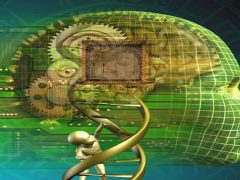
Paradigm Inertia In Reading Science and Policy – Part 2: A Warning Shot from the Bush Administration
Back to Part 1: Children of the Code Though most of our work was very well received, the more we explored the most common “brain processing challenge” involved in learning to read, the more we started to experience resistance. We first noticed this as we began to interview people who didn’t agree with the National […]
Share this:
- Click to share on Facebook (Opens in new window) Facebook
- Click to share on X (Opens in new window) X
- Click to share on LinkedIn (Opens in new window) LinkedIn
- Click to share on Pinterest (Opens in new window) Pinterest
- Click to share on Pocket (Opens in new window) Pocket
- Click to share on Reddit (Opens in new window) Reddit
- Click to share on Telegram (Opens in new window) Telegram
- Click to share on Tumblr (Opens in new window) Tumblr
- Click to share on WhatsApp (Opens in new window) WhatsApp
- Click to email a link to a friend (Opens in new window) Email
- Click to print (Opens in new window) Print
Mentorships in Education: A Podcast with David Boulton
https://www.buzzsprout.com/251698/939602-mentorships-in-education-with-david-boulton
Share this:
- Click to share on Facebook (Opens in new window) Facebook
- Click to share on X (Opens in new window) X
- Click to share on LinkedIn (Opens in new window) LinkedIn
- Click to share on Pinterest (Opens in new window) Pinterest
- Click to share on Pocket (Opens in new window) Pocket
- Click to share on Reddit (Opens in new window) Reddit
- Click to share on Telegram (Opens in new window) Telegram
- Click to share on Tumblr (Opens in new window) Tumblr
- Click to share on WhatsApp (Opens in new window) WhatsApp
- Click to email a link to a friend (Opens in new window) Email
- Click to print (Opens in new window) Print
